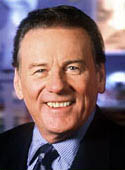A Hall of Famer On and Off the Field

An interview with Len Dawson, Hall of Fame quarterback and prostate cancer survivor
by Mike Morrison |
 In 1999, an estimated 179,300 new cases of prostate cancer will be diagnosed in the United States. It is the second-leading cause of cancer deaths in men, behind only lung cancer. In 1999, an estimated 37,000 men will die from prostate cancer. If found early, the five-year survival rate is 99 percent, and the ten-year rate is 63 percent. African-American men have the highest rate of prostate cancer â 34 percent higher than white men. The American Cancer Society recommends that men aged 50 and over talk to their doctors about getting a blood test and digital rectal exam every year. There have been cases, however, of men being diagnosed in their 20s and 30s. Related Links
|
Former Kansas City Chiefs great Len Dawson is one of the most prolific quarterbacks in the history of the NFL. He threw for 239 touchdowns and almost 29,000 total yards in his career, numbers impressive enough to make him one of just 23 quarterbacks currently enshrined in the Pro Football Hall of Fame.
His greatest moment of football glory came in 1970's Super Bowl IV, when he led the Chiefs to a 23-7 win over the Minnesota Vikings and was awarded the game's Most Valuable Player award.
Today he is better known as a co-host of HBO's Inside The NFL and color analyst for Chiefs games on KMBC-TV in Kansas City.
His most important battle, however, is one that he waged off the field. Dawson is a prostate cancer survivor. He recently gave a speech at the American Cancer Society's second annual "Prostate Cancer Lobby Day" at Massachusetts State Capitol in Boston where Information Please caught up with him.
IP: How did you learn you had prostate cancer?
LD: Well, my wife was concerned about me. Honestly, women seem to be more health conscious. She had just seen Bob Dole [a prostate cancer survivor] on TV discussing the importance of both the PSA blood testing and the digital rectal exam (DRE) for the detection of the cancer. I just figured it didn't apply to me but she insisted I attend a free screening later that month.
My PSA [Prostate Specific Antigen blood test] was normal but the DRE indicated there may be a problem. Well I said to myself, "I've never gotten anything for free that was worth anything. I want a second opinion." But sure enough, they were right. I was just fortunate that it was detected in the early stages. Unfortunately my brother Ron wasn't so lucky. He lost his battle with the disease.
IP: What exactly do you mean by "early stages?"
LD: "Early stages" is when the cancer is completely contained within the prostate. If it is detected when the cancer is entirely in the gland, the chance for full recovery is at its highest. If you're unable to catch it in time, the cancer can spread to the lymph nodes and at that point, the cancer is essentially incurable, but that doesn't mean your condition can't be improved.
IP: How are you doing now? Are there things you find you can't do now since the cancer?
LD: I was actually back working within two weeks of the surgery. And after four weeks, I was in Hawaii, enjoying myself, playing golf, and competing in an over-55 quarterback skills competition.
IP: Did your football experiences help you deal with your situation in any way?
LD: One of the reasons I loved playing quarterback was that I got to call the plays. The cancer put me in a position where I really wasn't in control anymore. As an NFL player, believe me I knew something about pain. I've had my toes banged up, my ankles, my legsâ¦you name it.
But this fight was one that was less painful, and a whole lot more severe. One thing I realized is that you just can't do it by yourself. I was lucky in that regard in that I could rely on my family, friends and co-workers for support.
IP: Any advice for men reaching the age where prostate cancer may be a problem?
LD: Get it checked out at least once a year. Granted, prostate exams aren't the most enjoyable things in the world, but they only last about 10 seconds. It's well worth it. Just think of the possible consequences if you don't get it done.
IP: We're going to switch gears on you a bit. What's your greatest football memory?
LD: Well, of course Super Bowl IV was the ultimate. If I could choose one play from that game, it would have to be a little hitch pass I threw to Otis Taylor in the third quarter. He took it all the way in for a touchdown and solidified the win.
My other favorite play was another pass to Otis in the playoff game against the Jets that put us in the Super Bowl. Funny how they both include him, huh? We were tied 6-6 in the fourth quarter on our own 20 and needed a spark. I've got to hand it to him, he called the play and made it work. I passed long to him and he took it all the way inside the Jets 20. The next play, we scored the game-winning touchdown.
IP: Any predictions for the upcoming season?
LD: I still can't figure out how Minnesota wasn't in the Super Bowl last year. I've got to say they're the odds-on favorite to win it all this year. And don't count out Denver. I think they can still get if done offensively even without John Elway, and their defense will really be bolstered with the addition of Dale Carter.







